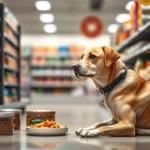
Introduction
Understanding dog nutrition is crucial for every pet owner. Just like humans, dogs require a balanced diet to maintain optimal health, energy levels, and overall well-being. One common question that arises among dog owners is: can dogs eat icing? This inquiry is particularly relevant during celebrations or family gatherings when we might be tempted to share our sweet treats with our furry friends. However, it’s essential to recognize the difference between what is safe for dogs and what could potentially harm them. Feeding dogs inappropriate foods, including certain sweets, can lead to serious health consequences. Let’s explore the intricacies of dog nutrition and the specific concerns surrounding icing.
Understanding Dog Nutrition
Basic Nutritional Needs of Dogs
A dog’s diet consists of three primary macronutrients: proteins, fats, and carbohydrates.
- Proteins are essential for growth, repair, and maintenance of body tissues. They also play a vital role in hormone production and immune function.
- Fats provide energy and help in absorbing certain vitamins. They also promote healthy skin and a shiny coat.
- Carbohydrates serve as a source of energy and are important for digestive health, especially when they come from quality sources like whole grains and vegetables.
In addition to these macronutrients, vitamins and minerals are crucial for a dog’s overall health. They support metabolic processes, strengthen bones, and bolster the immune system.
Common Nutritional Myths
There are many misconceptions surrounding dog diets. For instance, some people believe that dogs can thrive on a vegetarian diet. While some dogs can adapt to a vegetarian lifestyle, it requires careful planning to ensure they receive all essential nutrients. Another myth is that table scraps are healthy for dogs. In reality, many human foods can be high in salt, sugar, and unhealthy fats, which can lead to obesity and other health issues.
Human Foods and Dogs
Safe vs. Unsafe Foods for Dogs
Understanding which human foods are safe for dogs is essential for responsible pet ownership. Here are some common safe foods:
- Cooked lean meats (e.g., chicken, turkey)
- Carrots and green beans
- Apples and blueberries
- Plain cooked rice and pasta
Conversely, there are several toxic foods that should be avoided at all costs:
- Chocolate
- Grapes and raisins
- Onions and garlic
- Avocado
Why Some Human Foods Are Harmful
Certain ingredients found in human foods can have adverse effects on dogs. For example, chocolate contains theobromine, which is toxic to dogs and can lead to symptoms like vomiting, diarrhea, and even seizures. Other foods, like grapes, can cause kidney failure in some dogs. It’s crucial to be aware of these risks and to educate ourselves about safe feeding practices.
Icing and Its Ingredients
Common Ingredients in Icing
Icing is often a sweet and creamy topping made from various ingredients. Here are the typical components:
- Sugar: While sugar is not directly toxic to dogs, excessive consumption can lead to obesity, dental issues, and other health problems.
- Butter and cream: These fats can be hard on a dog’s digestive system and may lead to pancreatitis, especially in dogs prone to this condition.
- Flavorings and additives: Ingredients such as artificial sweeteners or food colorings can also pose risks to dogs.
Toxic Ingredients to Watch Out For
One of the most concerning ingredients in many icings is xylitol, a common artificial sweetener. Xylitol is extremely toxic to dogs and can cause a rapid release of insulin, leading to hypoglycemia (low blood sugar). Symptoms can include weakness, seizures, and even liver failure. Always check the ingredient list before sharing any human food with your dog.
Can Dogs Eat Icing?
General Consensus on Feeding Icing to Dogs
The general consensus among veterinarians and pet nutritionists is that dogs should not consume icing. While a small amount of icing might not cause immediate harm, it offers no nutritional value and can lead to various health issues if consumed regularly.
What Happens if a Dog Eats Icing?
If a dog accidentally eats icing, the effects can vary based on the ingredients and the amount consumed. Short-term reactions may include:
- Gastrointestinal upset: This can manifest as vomiting, diarrhea, or an upset stomach.
- Hyperactivity: The sugar content can cause a temporary spike in energy levels, leading to hyperactivity.
Long-term consumption of icing can lead to health complications, including obesity, diabetes, and dental problems. It’s always best to err on the side of caution when it comes to your dog’s diet.
Alternatives to Icing for Dogs
Dog-Friendly Icing Recipes
If you’re looking to celebrate with your dog while ensuring their safety, consider making dog-friendly icing using safe ingredients. Here’s a simple recipe:
Yogurt-Based Icing:
– 1 cup plain, unsweetened yogurt
– 1 tablespoon honey (optional, and only in moderation)
– A few drops of vanilla extract (avoid artificial sweeteners)
Mix these ingredients until smooth and use them as a topping for homemade dog treats.
Recommended Treats for Dogs
Instead of icing, consider offering your dog healthier snack alternatives that are both safe and nutritious. Here are some examples:
- Carrot sticks: Great for teeth and low in calories.
- Peanut butter (xylitol-free): A favorite among dogs, packed with healthy fats and protein.
- Frozen banana slices: A refreshing treat, especially during hot weather.
Conclusion
Navigating dog nutrition can be challenging, especially when it comes to human foods like icing. While the allure of sharing our sweet treats with our furry friends is strong, it’s vital to prioritize their health and well-being. The risks associated with feeding dogs icing, particularly due to its sugar content and potential toxic ingredients, far outweigh any temporary enjoyment. Always consult with a veterinarian for tailored dietary advice and stick to dog-friendly treats that provide the necessary nutrition for your canine companion.
FAQs
Can small amounts of icing be given to dogs?
While a small amount of icing might not cause immediate harm, it is not advisable to incorporate it into your dog’s diet due to its sugar content and potential toxic ingredients.
What should I do if my dog accidentally eats icing?
If your dog consumes icing, monitor them for any signs of gastrointestinal distress. If symptoms like vomiting, diarrhea, or lethargy occur, consult your veterinarian for guidance.
Are there any dog-friendly cakes or desserts?
Yes! There are many recipes for dog-friendly cakes and desserts made from safe ingredients like pumpkin, peanut butter, and oats. Always ensure that any recipe avoids harmful ingredients.
How can I make my dog’s diet more nutritious?
To enhance your dog’s diet, focus on providing high-quality dog food that meets their nutritional needs, incorporate fresh fruits and vegetables, and consider supplements if recommended by your veterinarian.









